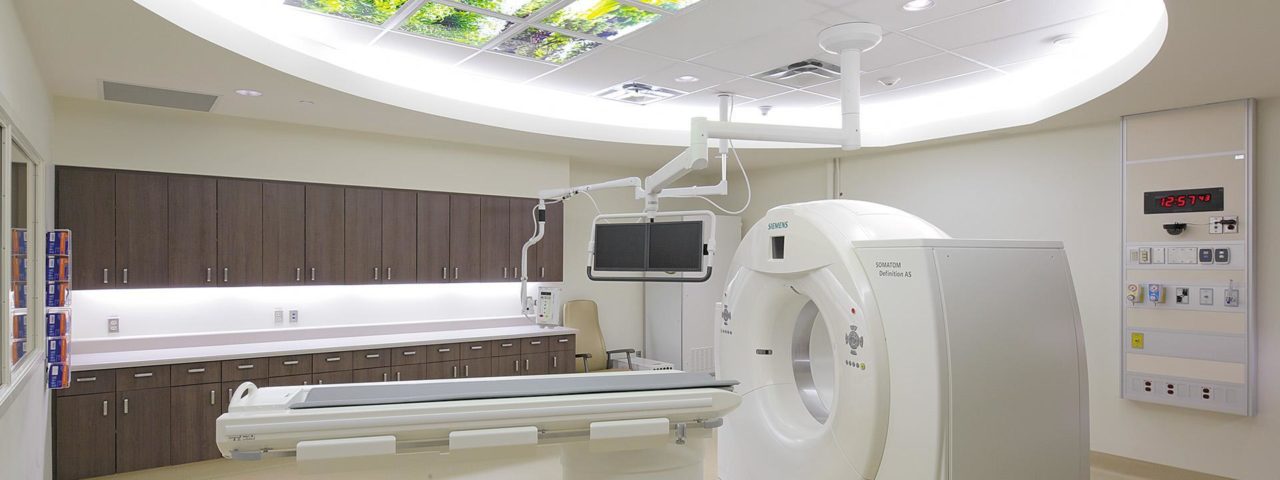A computed tomography scan (CT scan) combines X-rays and sophisticated computers to generate detailed 2D and 3D images of parts of the body. CT scans have been performed safely and successfully for more than 30 years. Advances in CT equipment allow us to produce images of unprecedented detail, in shorter times, and while using lower radiation doses than in the past. Oak Valley Health offers CT scans using the latest generation of technology.
You may need a CT scan as a result of illness or injury or when a physician suspects a medical problem that cannot easily be detected with a routine physical examination or other imaging procedures. CT may also be used for screening some types of cancer and for pre-surgical planning.
To have a CT, your doctor needs to fill out a requisition form. Download CT scan requisition form.
Learn more about making an appointment and coming to our hospitals.
Your CT scan will be performed by a medical radiation technologist (MRT) who is specialized in radiology and CT. To learn more about this health professional, please see this link for the College of Medical Radiation Technologists of Ontario.
Before Your CT Scan
Please be sure to confirm if there are any preparation instructions that apply to your procedure – different CT scans have different prep instructions. It is important that you follow the instructions provided. Please click here to contact our scheduling team and confirm these instructions or see below for general outlines.
As part of CT imaging we may ask you to remove your Glucose Monitoring Sensor or Insulin Pod if it overlays or interferes with the body section being scanned.
- CT with CONTRAST (any body part):
Do not eat or drink for four hours before the appointment, except only what is needed to swallow necessary medications. - Abdominal CT:
Do not eat or drink for four hours before the appointment, except only what is needed to swallow necessary medications. - Renal colic CT:
Drink two full 8 oz. glasses of water one hour before the appointment. Do not empty your bladder (pee) before the exam; a full bladder is necessary for imaging. - Cardiac CT:
Avoid caffeine products for a full 12 hours before your test and stop taking erectile dysfunction medications such as Viagra and Ciallis. Caffeine products include decaffeinated and caffeinated coffee and tea, chocolate and chocolate beverages, cocoa, pop, energy drinks, and any medication or supplements that may have caffeine. As part of the cardiac CT protocol, many patients will be given a medicine called a beta blocker when arriving in the CT department. This medicine helps to control the heart rate so that the images taken during the scan will be clear. This kind of CT appointment may take up to two hours. - Colon CT (CT scan of the large bowel, also called CT colonography):
You will have specific instructions to follow for two days before your appointment. This preparation will involve the use of barium and laxatives. For more information on this prep, please see the colonography preparation instructions that we will provide you. - CT enteroclysis (CT scan of the small bowel, also called CT enterogram):
You will have specific instructions to follow for the day of the appointment. We strongly suggest you plan to go directly home after the appointment. Please review the important instructions on the CT enteroclysis preparation sheet.
View other general patient preparations for diagnostic services procedures.
During Your CT Scan
When it is time for your images to be done, you will be brought inside of the CT scanning room. You will notice the large doughnut-shaped equipment. Our technologist will ask you to lie down on the padded table and make sure you are comfortable. You will be asked to lie very still during the scan and sometimes also be instructed to briefly hold your breath so that the images will be clear.
During the scan, you might hear a humming or buzzing noise but you should not feel anything unusual. You might notice the table move while we take several images of your body. Once the pictures start, the technologist will be watching you through a window during the entire exam and talking with you over an intercom speaker. Some instructions are prerecorded in English, and there is also a library of other languages that may be selected from to better support you during your scan.
Depending on the CT scan ordered, a solution called contrast (also known as X-ray dye) may be given to help improve visibility, accuracy, and clarity of specific areas of the body.
Let your doctor and the CT technologist know beforehand if you have ever had an allergic reaction to contrast. For most studies involving contrast, the total time spent in the CT department may be 60 to 90 minutes.
Depending on the body area being imaged, you may need to change into a hospital gown and remove jewelry.
After Your Visit
There are no residual side effects after a routine CT scan. If your CT scan involved contrast, please see the information on the CT with contrast handout.
Our radiologist will send the results of your test to your physician in writing. Your CT technologist is not able to give you the results of your test.
